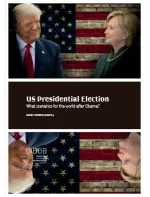Europe: Ally or Spent Force?

Europe has much more at stake in the coming US elections than a change of president. On the result depends the continuation of the liberal international order; the alternative would deepen the transatlantic breach. With Hillary Clinton, the transatlantic alliance would continue to face unprecedented challenges, but would remain at the centre of an international order based on the principles of cooperation and multilateralism. With Donald Trump, the United States would strengthen an international system based on competition between superpowers and zero-sum games.
This dichotomy is greater if Barack Obama’s mandate is taken as a reference. The Obama era began a new phase of transatlantic relations, far removed from the dynamics generated during George W. Bush’s presidency. The divisions arising from the Iraq war were repaired by a rhetoric close to European language on international relations, based on international dialogue, the strengthening of effective multilateralism, the use of “soft power” and partnership with Europe to resolve global challenges like climate change. The Berlin speech in 2008 was a paradigmatic example of the expectations generated by “the Obama moment”,1 both in terms of leaving behind the divisions of the global war on terrorism and rebuilding the
international order.
But if Obama began his presidency speaking the language of Europeans, he ends it advancing an international policy without the Europeans as central players. His “pivot to Asia”, the diversification of international alliances, the disagreements over the crisis in Libya and the tapping of European leaders’ phone calls (including Angela Merkel’s) have widened the transatlantic breach at the end of Obama’s mandate. Today, the Transatlantic Trade and Investment Partnership (TTIP) is further from conclusion because of both European reluctance and US pressure in fields such as courts of arbitration and genetically modified products. Since the beginning of his time in office, Obama has created more hopes in Europe than he has been able to fulfill, although many Europeans are now feeling they will miss him.
The distancing from the United States adds to Europe’s crisis. Incapable of being a top-level international actor in the shared management of global risks, the EU has shown itself to be divided and diminished on the international scene due to the almost eternal consequences of the euro crisis, the poor handling of the refugee crisis and, more recently, the United Kingdom’s vote in favour of Brexit. That the United States’ special friend has decided to leave the EU has been read in Washington as another sign of Europe’s decline. This has strengthened the voices urging Washington to widen its field of vision when it comes to alliances, both outside and inside Europe, where the Americans are aware that on issues of international policy they will have to seek support in the European capitals rather than the EU institutions.
If Obama began his presidency seeking to end the Bush era with its particular vision of international relations, the 2016 elections arrive with a shared undercurrent on both sides of the Atlantic. Brexit signified the success of populism based on the simultaneous adoption of an anti-establishment discourse and the lie as a political weapon. We are living in the post-truth political era, in which voters are presented with references that seem true but correspond neither to the data nor the evidence, and in which the influence of the elites and experts on political debates is discredited.
Donald Trump is a paradigmatic example of this. His political proposals are laden with demagoguery both on domestic (the Mexican wall) and foreign issues. In the last field, he sets out an alternative story based on what Walter Russell Mead calls “Jacksonian populism”,3 in which his disinterest in the international agenda is accompanied by apparent truths such as that working towards international security is equivalent to leaving Americans unprotected.4 This has led him to exhibit ambivalent positions on the US contribution to transatlantic security and NATO, to look favourably on the postulates of the “illiberal democracies” – led by Hungary’s Viktor Orbán and Poland’s Jaroslaw Kaczynski – and to favour a moderate policy towards Vladimir Putin’s Russia. All of this would translate into a serious reverse of Washington’s traditional policy towards Europe, would distance the US president from Germany and the European institutions and would expand the possibilities of weaving an alliance between Orbán, Trump and, perhaps, Marine Le Pen. It is no coincidence that many in Europe cling to the hope that the White House and the US administration would moderate Trump in the exercise of his
functions.
Hillary Clinton, on the other hand, would give US foreign policy a good dose of continuity, although the geopolitical landscape and the White House’s international challenges have substantially changed. Many argue that her presidency would be characterised by a more assertive and severe attitude than Obama’s – on Syria, for example – although she would maintain the fundamental principles of liberal multilateralism and would find her main allies in Europe. The question is whether, during her presidency, the EU would be established as a priority member or whether, hamstrung by internal crises, it would be seen as an added problem. Aware that Clinton would have to dedicate more time to transatlantic leadership, the Europeans hope that as president she would view transatlantic relations through the prism of the strength of tradition.
In summary, whether with Clinton or with Trump, relations between Europe and the United States will be subject to the change of cycle in international policy. The special relationship is giving way to a cooperation that is more pragmatic, in which Washington and Europe remain allies, but where the multipolarity and complexity of the international scene blur the predominance of their traditional privileged partnership. In a multipolar context, the new president will dedicate more efforts to strengthening bilateral links in Europe than treating the EU as a major international player.